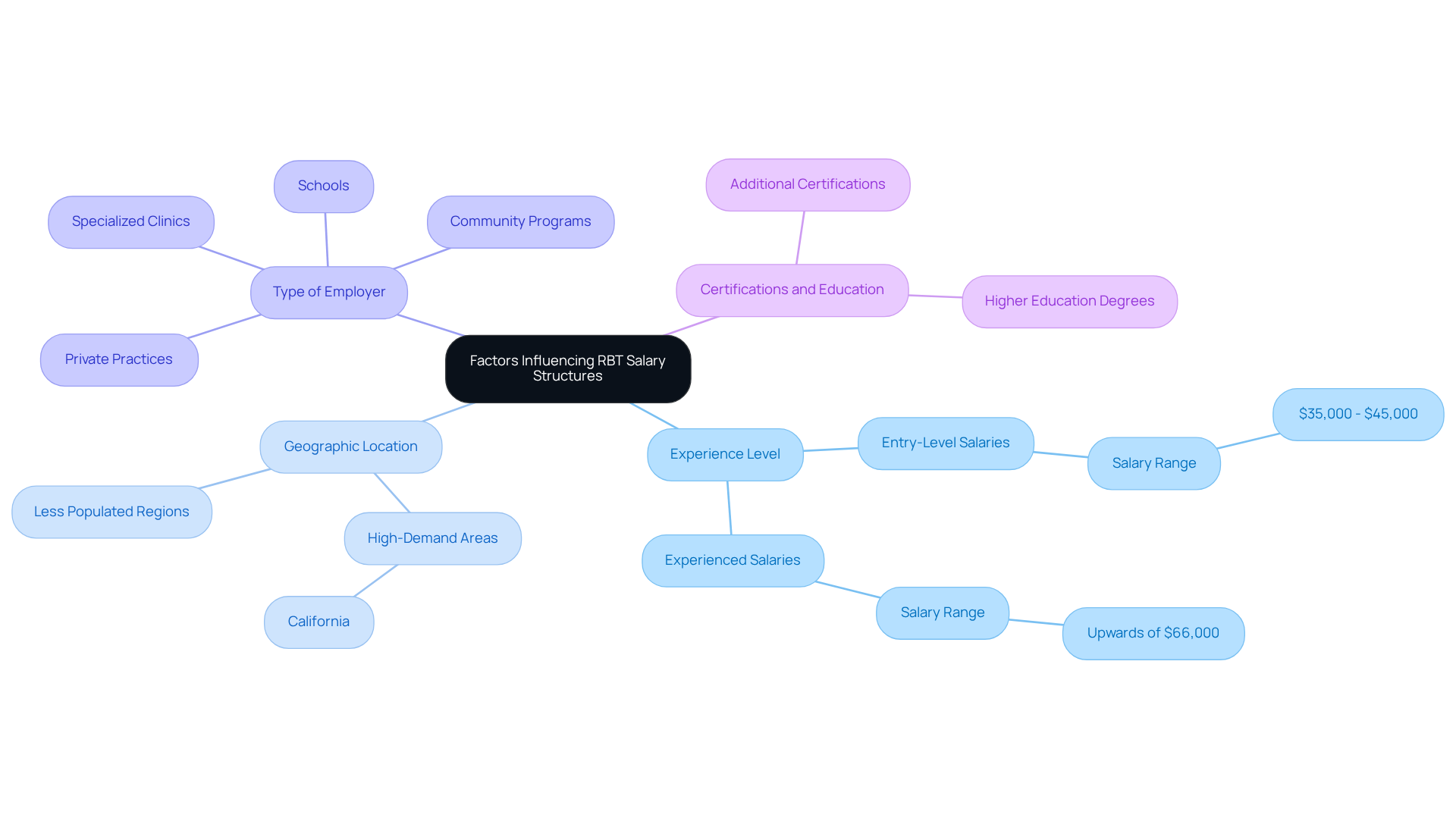September 2, 2025

Registered Behavior Technicians (RBTs) should recognize that their compensation is significantly influenced by various factors, including:
As the demand for qualified professionals in the field of ABA therapy continues to rise, it is crucial for RBTs to consider how these elements can impact their earning potential. By pursuing higher education and specializing in certain areas, RBTs can not only enhance their career growth but also increase their marketability in an expanding job market. Engaging in continuous professional development is essential for those looking to stand out.
What steps are you taking to elevate your career in ABA therapy? Now is the time to invest in your future and explore the opportunities available to you.
Understanding the dynamics of Registered Behavior Technicians (RBTs) in the field of Applied Behavior Analysis (ABA) therapy reveals a complex interplay of factors that shape their roles and compensation. As essential players in enhancing the lives of clients, particularly children with autism, RBTs implement treatment plans while navigating a landscape influenced by experience, location, and education.
With the demand for ABA services on the rise, how can RBTs leverage these factors to maximize their career growth and salary potential? This article delves into the intricacies of RBT pay structures and the opportunities for advancement within this rewarding profession.
Certified Technicians are essential paraprofessionals in the realm of Applied Analysis therapy. Operating under the supervision of (BCBAs), they are tasked with executing treatment plans aimed at enhancing the behavioral and developmental skills of clients, particularly children with autism. Their key responsibilities encompass several critical areas:
In summary, registered behavior technicians are instrumental in the success of ABA therapy, serving as the primary implementers of behavioral interventions.

Several factors significantly influence the rbt pay structures of Registered Behavior Technicians (RBTs). Understanding these elements is crucial for making and rbt pay negotiations.
Comprehending these factors empowers registered behavior technicians to navigate their career paths effectively and engage in successful negotiations regarding rbt pay.

The demand for Board Certified Behavior Analysts (BCBAs) is surging, with the market for ABA services projected to expand significantly in the coming years. This growth presents numerous for Registered Therapy Technicians (RBTs) that can lead to increased RBT pay. Key pathways for advancement include:
In summary, RBTs who actively pursue growth opportunities can significantly improve their RBT pay, career prospects, and earning potential in the field of ABA therapy. With new roles and higher salaries emerging in this booming market, the time to act is now.

Registered Behavior Technicians (RBTs) hold a vital position in the realm of Applied Behavior Analysis (ABA) therapy. They are the frontline implementers of treatment strategies aimed at improving the lives of clients, particularly children with autism. Their duties encompass direct therapy implementation, data collection, and family support, highlighting their critical role in facilitating effective behavioral interventions. Understanding the intricacies of RBT compensation, including the factors that shape salary structures, is essential for both current and aspiring professionals in this field.
This article explores several key elements that influence RBT compensation, such as:
It is evident that entry-level positions generally offer lower salaries, while seasoned professionals can command significantly higher wages, especially in high-demand regions. Furthermore, the discussion on career growth opportunities reveals that RBTs can increase their earning potential through higher education, specialization, and leadership roles, thereby positioning themselves for a successful career trajectory in ABA therapy.
As the demand for ABA services continues to escalate, so too do the prospects for Registered Behavior Technicians. By actively pursuing professional development and comprehending the factors that influence their pay, RBTs can navigate their careers with confidence. Embracing the opportunities available in this expanding market not only leads to improved compensation but also empowers RBTs to make a meaningful impact on the lives of those they serve. The time for action is now—invest in education, seek specialization, and take the next steps toward a rewarding career in ABA therapy.
What is the role of Registered Behavior Technicians (RBTs) in ABA therapy?
RBTs are essential paraprofessionals who implement treatment plans under the supervision of Board Certified Behavior Analysts (BCBAs), focusing on enhancing the behavioral and developmental skills of clients, particularly children with autism.
What are the key responsibilities of RBTs?
RBTs have several critical responsibilities, including direct implementation of therapy, data collection on client progress, collaboration with BCBAs, and providing training and support to families.
How do RBTs implement therapy?
RBTs engage in one-on-one sessions with clients, using ABA techniques to promote positive behaviors and reduce challenging ones.
Why is data collection important for RBTs?
Data collection is vital for evaluating the effectiveness of treatment plans and helps inform necessary adjustments in therapy based on client progress.
How do RBTs collaborate with BCBAs?
RBTs work closely with BCBAs to ensure therapy is delivered consistently and effectively, making adjustments based on data analysis.
What kind of support do RBTs provide to families?
RBTs may offer training and support to families, helping them understand the strategies used in therapy and how to reinforce these techniques at home.
Our expert recruitment strategies and AI-driven sourcing ensure that you receive top-notch candidates quickly, without compromising on quality. Whether you’re looking for BCBAs, Clinical Directors, or RBTs, we’ve got you covered.